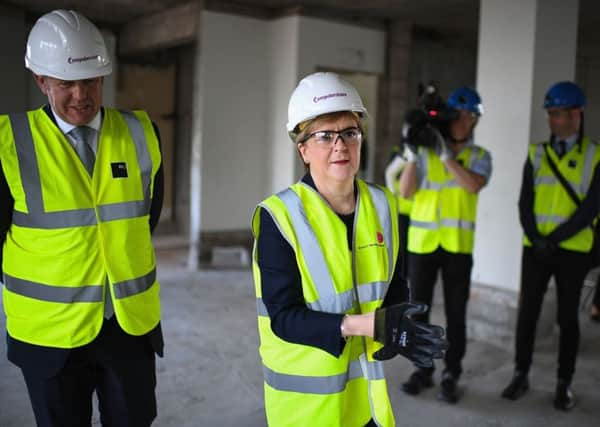Bill Jamieson: FDI does more than spare our blushes


But with the bouquets have come brickbats. FDI has brought low-skilled jobs, typically of the warehouse and call centre type. It cannot be counted on to bring long-term sustainable enterprise: critics point to the searing experience of the early 2000s when many overseas tech companies created what was hailed as Silicon Glen. But companies pulled out in the wake of the bursting of the dot.com bubble. Thousands of jobs were lost and specially built factories abandoned.
And it is true worldwide, not just in Scotland, that when companies and sectors hit hard times and need to retrench, it is the non-domestic plants and expansions that tend to be first for cutback and closure.
Advertisement
Hide AdAdvertisement
Hide AdFDI can also be expensive to attract, and the Scottish Government has lavished hundreds of millions of pounds over the years in overseas missions to attract investment and provide grant and loan support for foreign companies.
Only last week Scottish Labour leader Richard Leonard took aim at the SNP for the amount of money it had spent on state support for FDI. He pointed to figures from Scottish Enterprise showing that since coming to power, the SNP had handed out more than £220 million in Regional Selective Assistance (RAS) to foreign-owned companies, compared with £140m that has gone to Scottish-owned firms. The total amount of RAS has also fallen by 80 per cent since 2007.
Even within the SNP administration, doubts and mumblings have been heard about how effective Scottish Enterprise and its outreach arm Scottish Development International have been in attracting FDI.
So, what are the positives? It was heartening to hear encouraging figures last week on recent FDI successes. And such news is all the more welcome given the headwinds created by interminable Brexit negotiations and constantly expressed fears that overseas investment across the UK will collapse.
Last week Scottish Development International unveiled figures showing that 2017 proved not to be a catastrophe but a strong year for inward investment projects and job creation. A total of 126 FDI projects were recorded, generating more than 8,500 jobs for Scotland, up almost 9 per cent on the previous year.
This strong year-on-year increase in FDI jobs backs up the optimistic Scotland Attractiveness Survey by accountancy giant EY released earlier this year, showing the country’s ongoing attractiveness to foreign investors, during what has continued to be a challenging climate for inward investment.
Contrary to perception, more than 3,300 of the 8,500 jobs created or safeguarded by inward investment were high value posts, with salaries around 20 per cent higher than the Scottish average. Nor was the investment from already established US firms. The year brought 40 new investors to Scotland and Europe, the Middle East and Africa were the biggest regions for both FDI projects and jobs.
Technology and advanced engineering, tourism and life sciences were the biggest contributors for projects by sector – and the biggest job creators.
Advertisement
Hide AdAdvertisement
Hide AdNotable FDI successes during the past year included SThree’s new Centre of Excellence in Glasgow (creating more than 300 jobs) and Australian Fintech company Computershare’s Technology Centre in Edinburgh with the creation of 300 roles.
In the high value manufacturing and health segment, Bioclavis, a spin-out from Californian molecular profiling company Biospyder, is setting up in Glasgow, creating 43 new high value added jobs. The move is part of a £10m investment supported by SE with a £3.4m “Seek & Solve” research and development grant. The new business will work in close collaboration with the NHS and university researchers.
And in the technology and advanced engineering sector, Spiritus Developments, a US Data-Blockchain company, contributed more than 20 new high value added jobs, enhancing Scotland’s position as a leading location for data-related developments.
Small though these investments may appear, they are in critical areas of fast-changing digital technology and establish a foothold on which companies can build for future expansion.
Neil Francis, operations director of SDI, commented: “Not only do investors bring jobs and new business opportunities but they help to develop our supply chains and drive Scotland’s position in the global business arena by reinforcing our reputation as a fantastic place to invest and do international business.
“And the full impact of inward investment extends beyond this; increasingly we are seeing foreign investors making a real difference, not just to our economy, but to people and places across Scotland, by investing in and creating opportunities for our young people and by putting in place more inclusive working practices to generate wider benefits.
Ivan McKee, trade, investment and innovation minister, lost no time in driving home the message: “Investors are attracted to Scotland for many reasons. Access to a skilled and educated workforce, a supportive business environment and competitive tax rates and property and salary costs all play a crucial role – as does the bespoke support provided through our public sector bodies. It adds up to an attractive package that not only secures new investment in Scotland, but helps to retain and grow our existing investors.”
For all our misgivings on FDI, these figures are especially welcome given the slowdown in business investment across the UK as a whole. While UK GDP growth recovered to 0.4 per cent quarter-on-quarter in the April-June period the growth mix was not of the best with business investment falling and net trade sharply negative.
Advertisement
Hide AdAdvertisement
Hide AdBusiness investment fell 0.7 per cent quarter-on-quarter over the period – the second successive decline – and caused it to be down 0.2 per cent year-on-year. This, says EY economist Howard Archer, suggests businesses were cautious over investment due to mounting Brexit uncertainty. It is against this backcloth that Scotland’s inward investment gains are a notable stand-out.